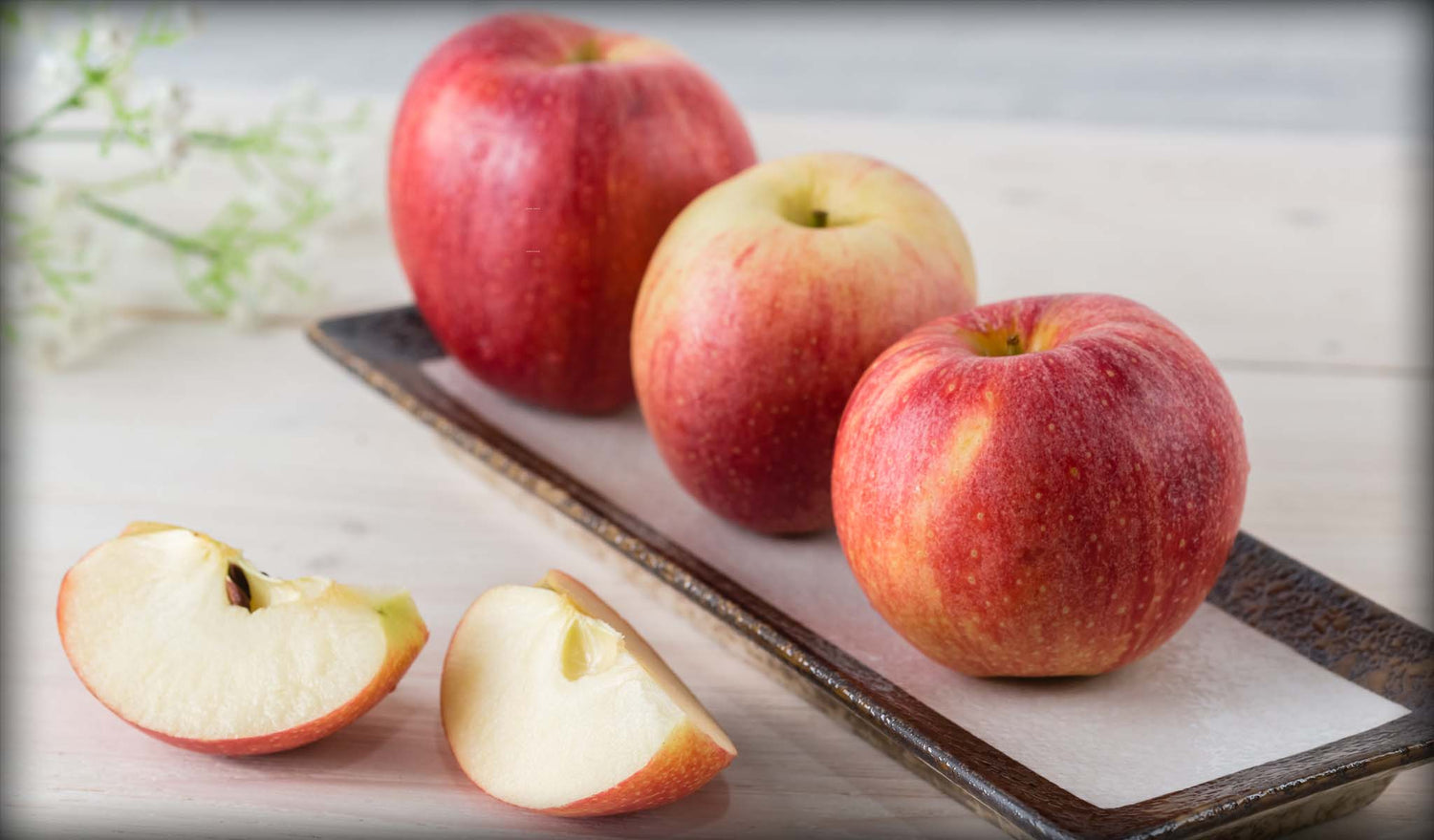APPLES
Is an apple a day really good for you? You bet, thanks to all apple nutrition offers. The old saying “an apple a day keeps the doctor away” turns out to be a pretty true cliché. According to Department of Food Science at Cornell University, “In the laboratory, apples have been found to have very strong antioxidant activity, inhibit cancer cell proliferation, decrease lipid oxidation, and lower cholesterol.” Not too bad for one of the most widely available, easy-to-use fruits there is!
Apple nutrition benefits include the ability to improve your digestion, thanks to being one of best high-fiber foods. Apples are also a top source of pectin, a soluble, gelatinous polysaccharide that binds to cholesterol in the gastrointestinal tract and slows glucose absorption. Eating apples can help lower disease-causing inflammation, improve heart health and help you better manage your weight. Plus, apples make a great, portable post- or pre-workout snack thanks to their quick-releasing natural sugars than can raise your energy.
While berries usually get most of the credit when it comes to supplying antioxidants, apple nutrition is a close runner-up. With a diverse family of phytonutrients present in apple pulp and skin, some studies link the consumption of apples with a reduced risk of certain forms of cancer, obesity, cardiovascular disease, asthma, Alzheimer’s disease and even diabetes.
Apple Nutrition Facts (and Types)
Apples are the fruit of the tree known as Malus domestica. Today, many different types of apples trees are grown worldwide, but they first originated in Asia thousands of years ago. Hundreds of varieties of apples are in existence today. There are skins that range in color from bright red to yellow, green, pink, or bi- or tri-colored patterns. They also come in a range of different tastes and levels of sweetness. It’s estimated that there are about 2,500 known varieties (cultivars) of apples that are grown in the United States and more than 7,500 varieties grown in the world!
According to researchers, the phytochemical composition of apple nutrition varies greatly between different varieties of apples. Plus, there are also small changes in phytochemicals during the maturation and ripening periods. While other types of apples are good choices, good-old red delicious seems to be the highest in antioxidants according to some sources.
Some of the most common types of apples include:
-
Red delicious
-
Honeycrisp
-
Fuji
-
Gala
-
Granny smith
-
McIntosh
-
Cortland
-
Golden delicious
-
Empire
-
Braeburn
-
Envy
-
Jazz
-
Cameo
-
Jonagold
-
Rome
-
Macoun
-
Zestar
-
Mutsu
-
Ambrosia
Apple Nutrition Facts
How many calories are in an apple? How many carbs does an apple have? One medium apple (approximately 182 grams) has about:
-
94.6 calories
-
25.1 grams carbohydrates
-
0.5 gram protein
-
0.3 gram fat
-
4.4 grams fiber
-
8.4 milligrams vitamin C (14 percent DV)
-
195 milligrams potassium (6 percent DV)
-
4 micrograms vitamin K (5 percent DV)
-
0.1 milligram vitamin B6 (4 percent DV)
-
0.11 milligram manganese (3 percent DV)
Apple nutrition also provides some vitamin A, vitamin E, niacin, folate, pantothenic acid, choline, betaine, calcium, iron, magnesium and phosphorus.
Benefits of Apples
1. Great Source of Cancer-Fighting Antioxidants
Apples are a high-antioxidant food and a very significant source of flavonoids in people’s diets in the U.S. and in Europe. In the United States, 22 percent of the phenolic antioxidants consumed from fruits are from apples, making them the largest single source of these compounds.
Apples are ranked second to cranberries among all types of fruit for their total concentration of phenolic compounds. Phenolic compounds are a class of bioactive substances that includes flavonoids. Compared to all other types of fruit, apple nutrition has the highest portion of free phenolic compounds. That means these molecules are not bound to other compounds in the fruit that can slow down their beneficial activity in the body.
Research shows that beneficial antioxidants found in apple nutrition include:
-
quercetin
-
catechin
-
phloridzin
-
chlorogenic acid
Because of these special compounds, apples do more than combat free radicals. They also have anti-proliferative and beneficial cell-signaling effects.
In studies, anti-inflammatory foods like apples are linked with the prevention of prostate cancer because of their supply of quercetin. Other evidence suggests that certain protective phytochemicals in the skin of apples can help inhibit the reproduction of cancer cells within the colon. Since both cardiovascular disease and cancer are thought to be highly related to a condition called oxidative stress — which happens over time as damage to cells and DNA forms — the ability to fight off free radical damage and oxidation is what gives apples their healing power. That’s why apples are part of a healing diet.
What is the healthiest part of an apple? You want to eat the whole apple to get the most benefits, including the skin. When researchers studied the antioxidant capacity of pears and apples, they found that diets that included the fruit peels had a significantly higher level of healthy fatty acids (higher plasma lipid levels) and antioxidant activity than diets that discarded the peels and only ate the fruit’s pulp.
2. Help Prevent Inflammation
Phytochemicals found in colorful fruits, including phenolics, flavonoids and carotenoids, are known to reduce the risk for many chronic diseases that are widespread but largely preventable. This is because phytonutrients keep arteries clear, lower inflammatory responses and prevent high levels of oxidative stress.
Research from California State University suggests that high-antioxidant foods are associated with “improved outcomes related to cognitive decline of normal aging, diabetes, weight management, bone health, pulmonary function, and gastrointestinal protection.”
3. Fight Heart Disease
There’s strong evidence that a diet that includes plenty of high-fiber foods, especially fresh fruits and vegetables, can help decrease the risk of numerous chronic diseases. That includes the No. 1 killer in the U.S.: heart disease. Many studies show that people who consume more fresh plant foods filled with antioxidants experience lower inflammation and, therefore, have a reduced risk of cardiovascular disease.
The specific type of fiber found in apples, pectin, is especially known to be beneficial for lowering cholesterol levels naturally. One 2003 study found that when rats were fed a diet high in apple pectin extract and freeze-dried apples, they experienced significantly lower levels of cholesterol absorption and triglycerides than the control group. The group of rats receiving both apple pectin and the dried apples (instead of only one of these) experienced the most benefits in terms of intestine fermentations and lipid metabolism. This suggests that interactions between fibers and polyphenols in apples together play an important role in markers of heart health.
One study carried out by Johns Hopkins Bloomberg School of Public Health followed adults over a 15-year period and found that, overall, greater intake of fruits and vegetables was associated with lower risk of all-cause death and cardiovascular disease. There’s also evidence that antioxidant-rich fruits can play a role in preventing strokes, chronic obstructive pulmonary disease, diverticulosis and hypertension.
4. High in Fiber
With over four grams of fiber in every one, apples are an ultimate high-fiber food. Eating an apple is a great way to make sure you cover your bases of 25–30 grams daily. Apples are especially known for providing pectin. Pectin is a type of soluble fiber that works by binding to fatty substances in the digestive tract — including cholesterol and toxins — and promoting their elimination.
The fiber found in apple nutrition helps make you feel full. It expands in your intestines and takes up volume. It’s also important for detoxification. Apple nutrition benefits the digestive system because pectin regulates the body’s use of sugars and cholesterol. It also helps cleanse the blood and digestive tract.
5. Improve Digestive Health
Following a high-fiber diet has been shown to fight digestive issues like IBS (irritable bowel syndrome) and even cancers of the digestive system. Higher fruit intake is correlated with better general digestive health, especially of the colon, stomach and bladder. The phytonutrients found in apples can help protect the digestive organs from oxidative stress, alkalize the body and balance pH levels.
When it comes to natural constipation relief, consuming plenty of high-fiber foods is a great way to prevent or treat this issue. Pectin in apple nutrition is also considered a natural diuretic. It has a mild laxative effect, so this can help combat bloating and uncomfortable water retention. Try either eating raw apples (remember to also eat the skin) or adding them to recipes by blending them first. You can also obtain benefits by juicing apples, although you want to avoid the types of high-sugar juices found in most grocery stores.
6. Good Source of Vitamin C
One medium apple supplies about 14 percent of your daily vitamin C. Vitamin C is considered a powerful antioxidant that’s important for skin, eye, immune and brain health. Like other antioxidants we obtain through fresh vegetables and fruits, vitamin C fights free radical damage and helps protect DNA and cells from mutation and malformation.
Research shows that vitamin C is crucial for maintaining a healthy metabolism and repairing tissue, especially in the eyes and skin. Vitamin C-rich foods like apples have natural anti-aging effects because they promote skin cell renewal, help heal wounds or cuts, guard against infections and harmful bacteria, and also block damage from UV light exposure.
7. Can Help You Manage Your Weight
Much research has shown that higher fruit and vegetable intake is linked with protection against obesity. While apples provide high levels of important nutrients and antioxidants, they’re also low in calories since a high percentage of their volume is water and fiber.
Because they have a good dose of dietary fiber, which contains zero digestible calories and is useful for sustaining healthy blood sugar levels, apples can satisfy your sweet tooth without weighing you down or adding to food cravings. Indeed, when added to other smart ways to shed pounds, you can lose weight fast with the help of apples.
8. May Help Fight Diabetes
Wondering if the sugar in fruit bad for you? Researchers from the Centers for Disease Control and Prevention found that eating five or more combined servings of fruits and vegetables daily significantly cut the risk of diabetes formation in adults. It might seem counterintuitive that fruits and vegetables, which naturally contain some sugar, are inversely associated with diabetes incidence, but this is shown time and time again in studies.
Certain flavonoids present in apples and other fruits are known to improve insulin sensitivity. This is key to preventing both diabetes and long-term weight gain. The other antioxidants and fiber found in apples also play a role in their anti-diabetic effects.
Because apples are high in fiber, they’re considered a fruit that’s low on the glycemic index. Compared to refined carbohydrates or sweetened products, apples have the ability to unleash sugar into the bloodstream at a slower rate. This means they keep blood sugar levels more stable and prevent fluctuations in blood glucose that can potentially lead to insulin resistance.
9. Help Fight Asthma Symptoms
Interestingly, apples are shown to act like natural remedies for asthma. In fact, they are associated with general pulmonary health. In a 2003 study published in the American Journal of Clinical Nutrition involving 1,600 adults in Australia, apple and pear intake was associated with a decreased risk of asthma and a decrease in bronchial hypersensitivity.
The study surveyed nearly 600 individuals with asthma and 900 individuals without asthma about their diets and lifestyles. Total fruit and vegetable intake was found to be only weakly associated with asthma, but apple intake showed a stronger inverse relationship with asthma. The beneficial effect was most clear in subjects who consumed at least two apples per week.
What’s also interesting is that this seems to be uniquely an apple nutrition benefit. Onion, tea and red wine consumption were not related to asthma incidence even though they also contain similar phytochemicals. This suggests that there are special interactions of apple flavonoids that help control asthma symptoms better than other antioxidants and nutrients.
10. High Source of Boron
Here’s a little-known fact about apples nutrition: Apples are one of the best natural sources of boron. Boron is a mineral that is important for building strong bones and helping to prevent osteoporosis. Boron uses and benefits include helping develop sex hormones, building muscle mass and supporting brain function. Some evidence also shows that low boron intake might be associated with fatigue, arthritis and mood changes.
Uses in Traditional Medicine
Traditional uses of apples include helping treat digestive issues like constipation and dysentery. Dysentery is an inflammatory disease of the intestine. It’s especially common in the colon and results in severe diarrhea and abdominal pains. Apples also were used to treat fevers, heart ailments, scurvy and warts.
Apples are said to have cooling, astringent properties that can help ease heartburn and a sour stomach. Thanks to their antioxidants and vitamin C, apples have been traditionally used to help cleanse the mouth and teeth. They were also used to prevent diseases associated with vitamin D deficiency. Many folklore remedies utilized apples in various ways, including to make vinegar, herbal teas and alcohol. A healing tea or syrup can be made from the bark of an apple tree to relieve a sour stomach and restore strength and tone to the sphincter.
Apples and their leaves have also been traditionally chewed and applied to the skin to treat inflammation, swelling, boils or infected bites. In Ayurvedic medicine, stewed/cooked apples are recommended to prevent constipation. Apples are considered helpful for balancing Kapha energy. In other words, they help relieve sluggishness, weight gain, blocked sinuses, allergies and colds. Apples also increase Vata and Pitta. Cooked apples help create “digestive fire” and “enhance immunity, happiness, and strength.” In Ayurvedic cuisine, apples and other fruits are used to make chutneys and preserves. They’re often combined with spices, such as cinnamon, fennel, dry-roasted ground cumin, ginger and coriander.
Where to Find and How to Use
When it comes to picking apples at the grocery store or farmers market, definitely try to buy organic apples. Unfortunately, the Environmental Working Group lists apples on the “Dirty Dozen” list of most chemically sprayed fruits and veggies for the past eight years in a row. Research in 2015 showed that apples were the fruit/veggie with the highest number of pesticides among 48 different kinds that were studied!
Does this really matter? Yes! A recent study shows people who buy organic produce have lower levels of organophosphate insecticides measured in their bodies even though they eat more produce than people who buy mostly conventionally grown fruits and vegetables.
Store apples in the refrigerator to keep them fresh for longer. They have a pretty long shelf life and last for several weeks on average. That means they’re good to pick up at the grocery store whether you need them right away or not.
Even though it’s believed that storing apples has little to no effect on their phytochemical levels, the way that they’re cooked and processed can also really affect their availability of nutrients.
Many of the antioxidants found in apples are considered delicate. They are preserved best when the apples are eaten raw or lightly cooked. High temperatures can negatively impact an apple’s nutrients. Try to avoid any packaged foods made with apple. Instead use them in your own kitchen in a variety of ways that require little or no cooking.
Risks and Side Effects
Apples are one of the fruits that have a higher potential to cause allergic reactions, along with peaches and kiwis. Fruit allergies are frequently observed as reactions in the mouth, lungs, face, nose and stomach. These can occur only minutes after consuming the trigger food and show up in itching and swelling of the mouth, lips and throat. If you or your children experience these reactions after eating apples or other food allergy symptoms, considering having an allergy test done before consuming them again.
Apples might also cause digestive problems for some people. That’s because they contain FODMAP carbohydrates that some people have difficulty breaking down. Apples, along with pears and some other types of fruits and veggies, can potentially ferment in the gut and cause IBS, bloating and digestive discomfort. If you have these issues and can’t seem to figure out why, you might want to experiment with following a low-FODMAP diet for a period of time.
Final Thoughts
-
Apples are the fruit of the tree known as Malus domestica. It’s estimated that there are about 2,500 known varieties (cultivars) of apples that are grown in the United States and more than 7,500 varieties grown in the world.
-
Apple nutrition is high in fiber. Apple nutrition also provides pectin, vitamin C and antioxidants.
-
Benefits of apple nutrition include improving digestion; helping with weight loss; preventing inflammation, heart disease, diabetes, asthma and constipation; and providing nutrients like boron, vitamin and flavonoid antioxidants.
Resources



